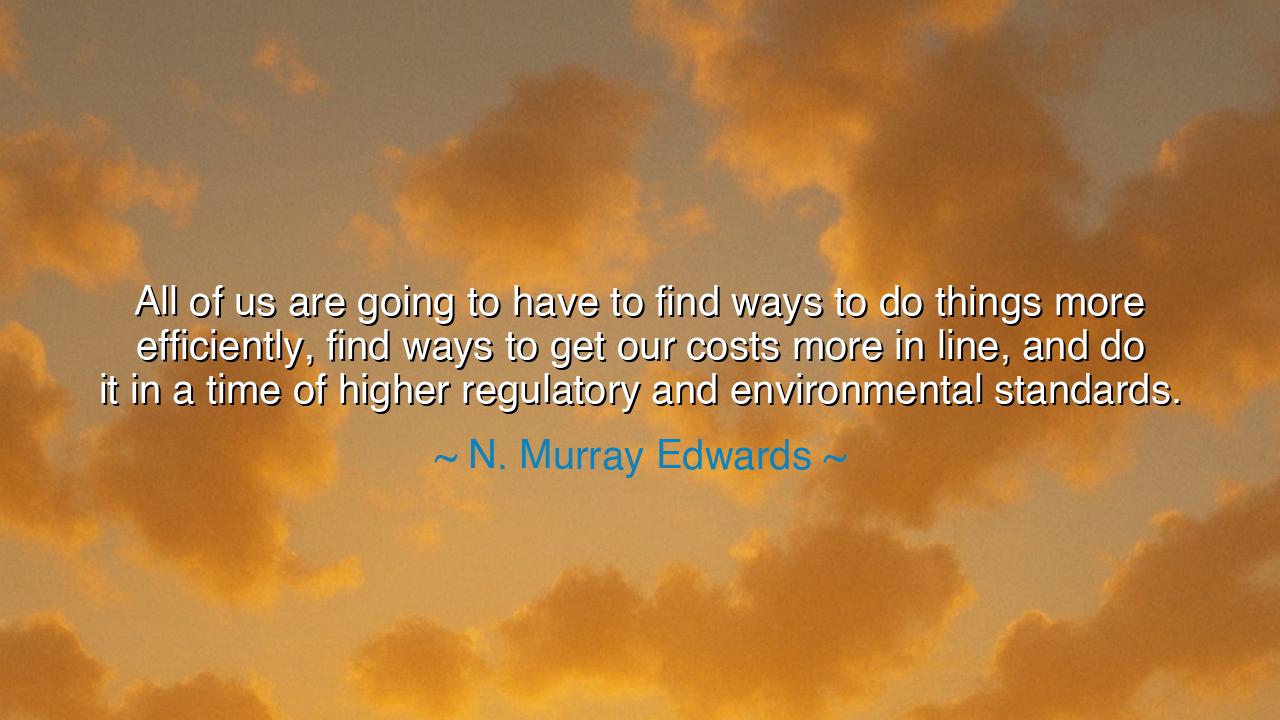
All of us are going to have to find ways to do things more
All of us are going to have to find ways to do things more efficiently, find ways to get our costs more in line, and do it in a time of higher regulatory and environmental standards.






Hear now the sober yet steadfast words of N. Murray Edwards: “All of us are going to have to find ways to do things more efficiently, find ways to get our costs more in line, and do it in a time of higher regulatory and environmental standards.” These words carry the weight of both warning and guidance. They call not only to merchants and laborers, but to every soul who dwells upon the earth. For they remind us that in an age of rising expectation and dwindling tolerance for waste, survival and success belong to those who walk the path of wisdom, efficiency, and respect for the natural order.
The heart of this teaching lies in efficiency. In ages past, strength alone was praised: the farmer who plowed with more oxen, the warrior who marched with larger armies, the merchant who hoarded greater stores. But wisdom teaches us that raw power is not the highest virtue—rather, it is the clever mind that makes the most of what is given, that wastes not, but multiplies by ingenuity. So too Edwards calls us to embrace efficiency: to refine our methods, to cast aside the excess, and to walk with discipline in a world that no longer allows the luxuries of waste.
The second truth he proclaims is the need to bring costs in line. This is not merely the balancing of coin, but the art of harmony. For every society must weigh its labors against its rewards, lest it collapse under debts or consume its own foundation. History offers us many warnings: the mighty empire of Spain, rich with the gold of the New World, squandered its wealth upon endless wars, and though its coffers were full, its people remained poor. Waste and imbalance, even in abundance, led to decline. Edwards reminds us that prosperity rests not in boundless spending, but in measured stewardship.
But his words bear a third and greater weight: that all this must be done in the time of higher regulatory and environmental standards. Once, men thought the earth boundless, its rivers infinite, its skies unending. They cut, burned, and dug as though the world could endure forever. Yet now we see the truth: the seas rise, the forests shrink, the air thickens. New laws rise in response, demanding that industries respect the planet, that economies reckon with the earth’s limits. Edwards acknowledges this age, not as a curse, but as a summons to ingenuity. To prosper under these standards is not weakness—it is greatness.
Consider the story of Japan after the devastation of World War II. With scarce resources and strict limitations, the nation could not rely on abundance. Instead, it embraced efficiency as a creed, birthing innovations in technology, manufacturing, and energy that astonished the world. Out of scarcity, Japan forged strength; out of limitation, it crafted excellence. Edwards’s words call us to follow the same path, to see in higher standards not chains, but opportunities to innovate and lead.
The lesson is as timeless as it is urgent: when the world raises its expectations, the wise do not complain, but rise to meet them. Efficiency, discipline, and respect for the earth must become the new virtues of both commerce and life. To resist this call is to cling to the shadows of the past; to embrace it is to step into the light of the future.
And what of us, the hearers of this teaching? In our homes, in our work, in our communities, we too must strive for balance. Let us waste less, let us honor the earth in the choices we make, and let us seek always to do more with less, not in the spirit of deprivation, but of wisdom. For by embracing efficiency, we lighten the burden upon the world and secure a legacy for those yet to come.
Therefore, let Edwards’s words be remembered not as a command of necessity alone, but as a beacon of hope: to work wisely, to spend justly, and to live in harmony with the earth. Those who heed this call shall endure the trials of the present and flourish in the age to come.






AAdministratorAdministrator
Welcome, honored guests. Please leave a comment, we will respond soon